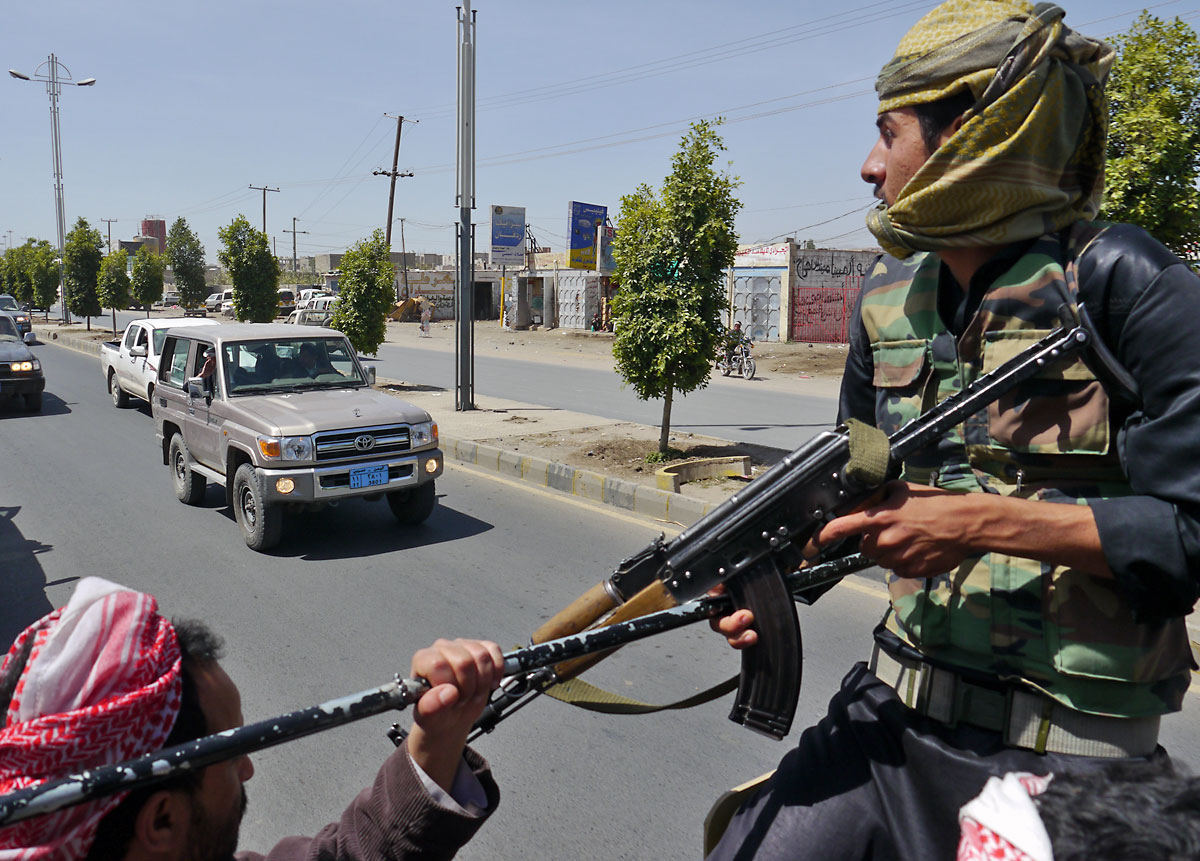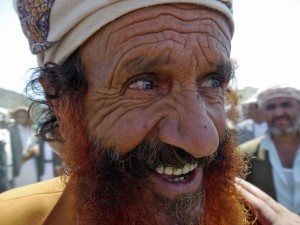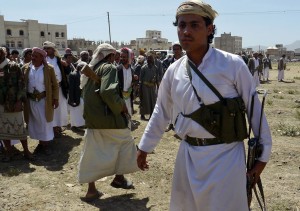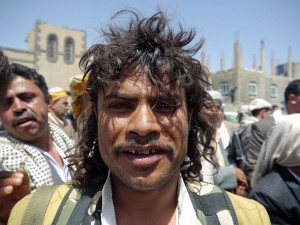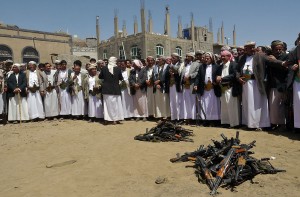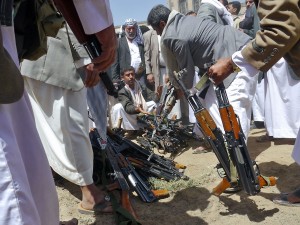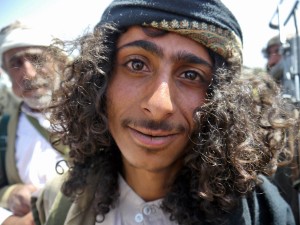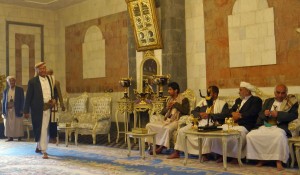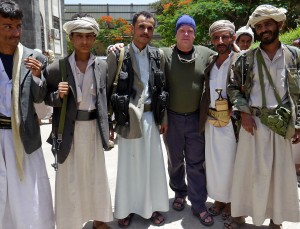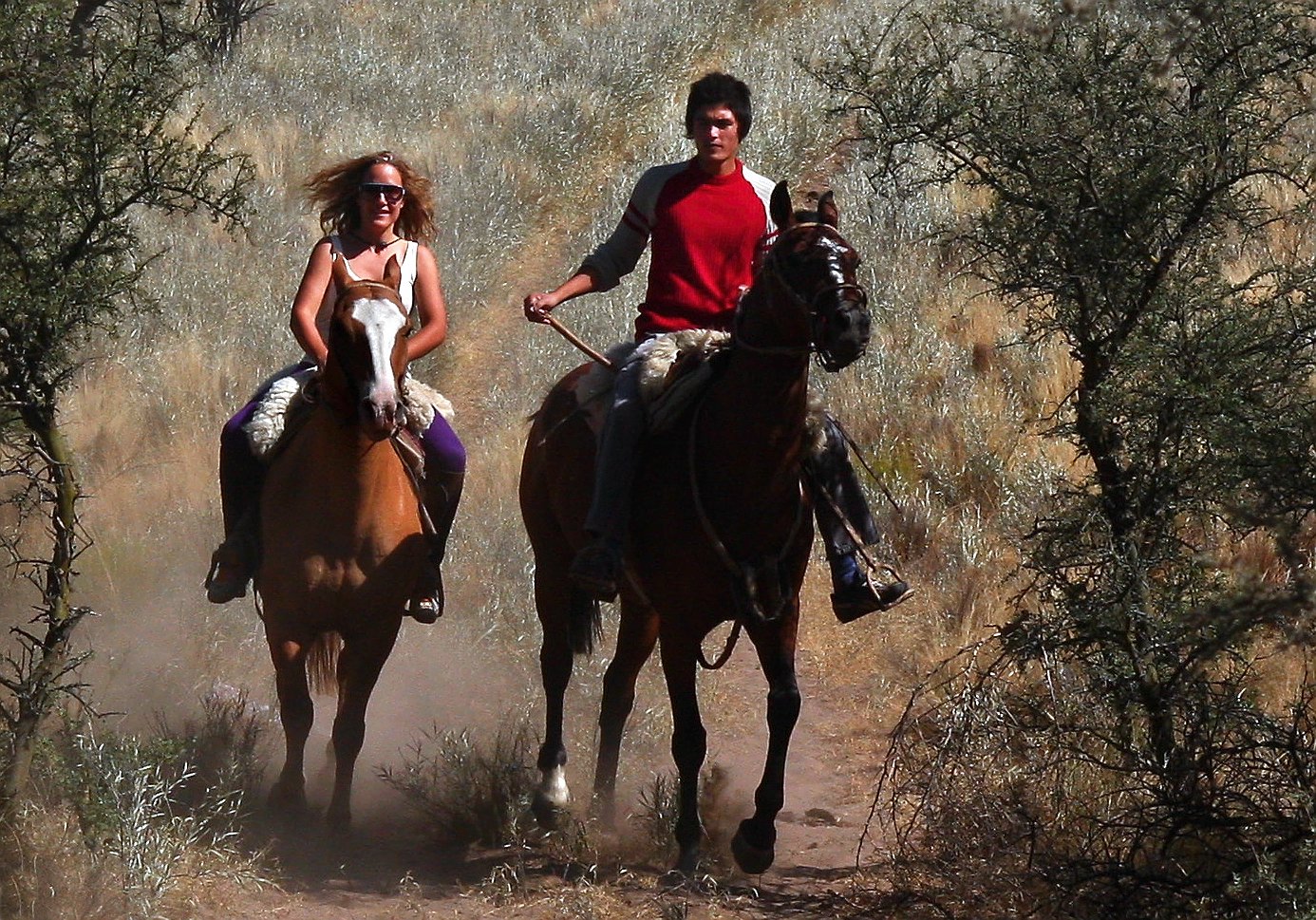“Get inside!” shouted one of the bodyguards, Adnan, to us and Tanya and Benjamin got into the armoured jeep, but I took a chance and jumped up on the back of it together with more bodyguards and the sheiks security.
The jeep shot off full speed down the road, followed by at least 50 other cars, packed with regional sheiks belonging to the biggest tribe inYemen, the Bakil. And of course our host, one of the leaders of the Bakil tribe, Sheikh Mohammed Naji Abdul-Aziz Al-Shayef. We were all heading for a place outside the capital, where the leaders of the second biggest tribe in Yemen, the Hashed, were waiting. What I was experiencing was a tradition older than the prophet Muhammed, namely tribal law and a tribal court. It is said that possibly as much as 90 percent of all conflicts in tribal areas are resolved by using this ancient system. A conflict resolution based on tolerance and forgiveness, dialogue and negotiation and which is much more flexible and responsible than the fixed written rules of the non-tribal law of Yemen.
“What has happened is that the son of a Hashed sheikh have been killed by one of ours and we are going to meet the Hashed and ask for forgiveness” , the sheikh of Amran told me whilst we were sitting in the palace sized house belonging to Sheikh Mohammed Naji Abdul-Aziz Al-Shayef, earlier in the morning; “What is going to happen now is called banadeq assawab, which means the Guns of Reason, which for us signifies our confession of this mistake. And our sheikh is the arbitrator and will ask for forgiveness or at least avoid getting our man killed.”
I felt I was part of an action movie. The speed we travelled through the city was high and every 3-4 minutes our driver put full brakes on, or did a u turn or passed the column of our cars in high speed, all whilst the two main body guards, Ayman and Adnan, where keeping an eye on the surroundings. I think more as a joke, the sheikh had said to us, the day before, that he would put us in this armoured jeep just in case Al Qaeda would turn up. He smiled saying that. There’s an unreasonable fear of this group in Sanaa right now, but in the Sheikhs case, I am sure he worried about other enemies he might have. A tribal chief has of course enemies.
“They´re crazy!” shouted a young photographer from the Al Azal Channel, when we arrived to the outdoor meeting, when a grenade detonated on the side of a nearby mountain; “The tribes are crazy!”
They sure look wild the tribesmen, but unfortunately the tribes and their tribal system is often, if not always, portrayed negatively in Western media, well, Arab media as well and I know many of my Yemeni friends really dislike them, because as in the case with the media, they are often blamed as being in the way of proper development and state building. As a matter of fact, according to some of the best known academics on the Yemeni tribes, like my friend Khaled Fattah and Nadwa Al-Dawsari, they have played an important role in keeping Yemen together for centuries of weak governments meaning corruption, political instability and bad economy. The tribes of Yemen basically provide social order in the absence of a weak state.
“Get out! Get out and come with me!” shouted Adnan, one of our body guards.
We all got out, I heard fire in the background, we got pushed all over the place, as everybody else and we were all heading for the same place, a big open area in front of a halted construction site and a mosque. Dust blew all over. Ayman turned up and dragged me through the crowd, the Sheikh came out of his car, followed by a big entourage, and even if this was serious business, everyone seemed pleased and happy. For me this is such a Yemeni trait. Smiling no matter how hard the times. Suddenly the big crowd who moved forward stopped, Ayman dragged me through the crowd, I ended up with Tanya in front of the two tribes on each side which looked like a soccer pitch. Young Bakil men arrived carrying big amounts of weapons and made two big heaps of weapons in front of a long line of Bakil tribal sheikhs. I looked at the Hashed, they had a more serious appearance , and two of their sheikhs countered a call from the Bakil sheikh, with a short shout and than they started walking towards us.
“This is called banadeq assawab or Guns of Reason” , somebody whispered in my ear and I turned around and said; “Meaning?”
I saw a man at my side dressed what I would call the Taizz style, with shirt and trousers like an office worker, and he spoke good English.
“Well, Sheikh Mohammed Naji Abdul-Aziz Al-Shayef is the arbitrator and this is a way to show that the Bakil confess and hope the Hashed Sheikh will give his tribe forgiveness. The guns and money here are guarantees that the tribes will follow the verdict.”
Suddenly it seemed everyone turned up in front of the weapons and suddenly a jeep came and all weapons were loaded on the back of it.
“They have said yes to forgiveness” , my new friend said; “That is good.”
As sudden most attention turned to us and our cameras. Everyone wanted to get his photo taken. This was a joy to agree upon, since there are an unlimited amount of colourful personalities amongst these men. They came from all over the country. Al Jawf, Saada, Marib, all these places I want to cross by camel, but which seem more impossible to do by the day. And seeing the tribes here, made me even more convinced I wouldn´t get any problems, because within the tribes, as this court case, everything is based on collective responsibility and strict tribal rules.
“We must leave!” Ayman and Adnan told us and wanted us to return quickly to the armoured jeep.
Something had happened. But it was hard not continuing taking photos of these personalities. But our body guards were adamant. This time we had to squeeze in all of us inside the drivers cabin of the jeep. We heard some shooting, even a grenade, but minutes later, full speed, we were heading away on the motorway which I recognized as the one leading to the airport. For some unknown reason, maybe as a show off, a bit of added drama to their day, the armoured jeep took the main route through the centre, Tahrir, Hadda and just imagine this scene, anywhere else in a capital city in the world, going down the main drag, we inside an armoured car and the back of it full of heavily armed qabilis (tribes men). Not many took notice. It wasn´t anything out of the extra ordinary in Sanaa!
They dropped us off at the Sheikhs office and asked to be photographed with their guns. They were really far too young many of them and should have been at school instead. We spent a couple of hours there, waiting for him to come back, so we could do an interview. But he never turned up. We were told that the family of the killed, didn´t agree at all with their sheiks and demanded more justice. Either in the shape of more money, weapons or harder punishment. Somebody even called it black shame, which is the worst offence you can do in a tribe. Other offences included in this list are killing men even if they’re accompanied by women, violating safe havens, blocking roads and kidnapping!
”Do you want to get kidnapped?” the sheikh had asked me the day before when visiting his office and smiled a bit; “I think what you want to do is very brave and it would help my country, but at this moment it is impossible. The situation has changed a lot since you were here half a year ago. I cannot guarantee your safety if you travel by camel.”
Right now everyone has said the same. Great idea, but not right now. I disagree of course. It is needed more than ever. There´s not an hour without bad news coming out of this country and believe me, it is just a tiny bit of the truth. And I will make my camel journey happen. Somewhere inYemen.
However, I have realized since coming here, which in itself was very important, that the situation has changed since my last visit. Due to the Arab Spring both the government and the tribes are weak. They can´t offer the protection they once could. A new generation of young people have evolved due to the protests who run their own game and don´t care about the tribal law. So, the danger along my proposed route thorugh Marib, Al Jawf, Shabwa and Hadramawt isn´t the heavily over dramatised presence of Al Qaeda, or AQAP, it is young tribal men playing their own game and gain. I guess this is the greatest threat to a stabile Yemen!
To see more photos, click here!
